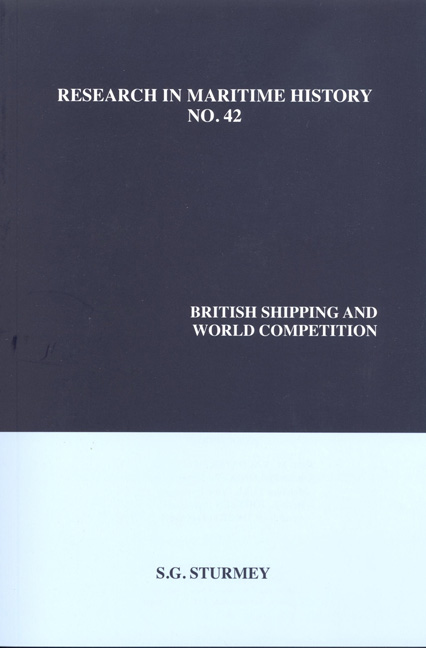Book contents
- Frontmatter
- Table of Contents
- Series Editor's Foreword
- About the Author
- Preface
- Figures and Tables
- Chapter 1 The Problem Defined
- Chapter 2 High Water: The Pre-1914 Period
- Chapter 3 War and Reconstruction
- Chapter 4 The Troubled Years: The Interwar Period
- Chapter 5 Nationalism in Shipping in the Interwar Years
- Chapter 6 The Birth of the Liberty
- Chapter 7 The Prosperous Age: The Postwar Period
- Chapter 8 Enemies of Competition in the Postwar Years
- Chapter 9 Flags of Convenience
- Chapter 10 Economics of Shipping Enterprises
- Chapter 11 Shipowning and Resource Allocation
- Chapter 12 Labour Relations and Labour Costs (by Basil Mogridge)
- Chapter 13 The Conference System
- Chapter 14 The Structure of the British Industry
- Chapter 15 The Question Answered
- Epilogue The Future
- Appendix The Contribution of British Shipping to the Balance of Payments
- Bibliography
- Index
Chapter 4 - The Troubled Years: The Interwar Period
- Frontmatter
- Table of Contents
- Series Editor's Foreword
- About the Author
- Preface
- Figures and Tables
- Chapter 1 The Problem Defined
- Chapter 2 High Water: The Pre-1914 Period
- Chapter 3 War and Reconstruction
- Chapter 4 The Troubled Years: The Interwar Period
- Chapter 5 Nationalism in Shipping in the Interwar Years
- Chapter 6 The Birth of the Liberty
- Chapter 7 The Prosperous Age: The Postwar Period
- Chapter 8 Enemies of Competition in the Postwar Years
- Chapter 9 Flags of Convenience
- Chapter 10 Economics of Shipping Enterprises
- Chapter 11 Shipowning and Resource Allocation
- Chapter 12 Labour Relations and Labour Costs (by Basil Mogridge)
- Chapter 13 The Conference System
- Chapter 14 The Structure of the British Industry
- Chapter 15 The Question Answered
- Epilogue The Future
- Appendix The Contribution of British Shipping to the Balance of Payments
- Bibliography
- Index
Summary
The troubled years cover the period from the end of the immediate postwar boom to the outbreak of another war. It is a period in which the development, indeed the maintenance, of international trade was hampered by a widening net of tariffs, quotas and exchange restrictions as each country tried to handle the problems of unemployment and to satisfy its nationalistic ambitions. Shipping suffered from the depression and the restrictions on trade, but it suffered in other ways also, for example, by the decline in international migration and the growing use of subsidies and other devices to encourage the fleets of individual countries at the expense of those of nations, such as Britain, Norway, Greece, Denmark, Sweden and Holland, which depended substantially upon the carriage of foreign-owned goods to maintain their shipping fleets.
The Trend of British Shipping
The changing position of British shipping in the period was shown in figure 1. For convenience, the position in a few important years is repeated here;
1919 16.3 million tons; 34.0 percent of world total
1930 20.4 million tons; 29.9 percent of world total
1939 17.3 million tons; 26.8 percent of world total
1939 18.0 million tons; 26.1 percent of world total
Far from being restored to its prewar position, by 1939 the British mercantile marine, after increasing up to 1930, was slightly smaller than in 1913 and as a proportion of the world fleet declined continuously throughout the period.
The fall in the proportion of the world fleet which was British-owned and registered can be separated into two parts. It was shown in chapter 2 that before 1914 the rate of growth of British and non-British shipping was such that the proportion of British shipping in the world was declining. A continuation of this pre-1914 trend into the interwar period would have resulted in the proportion of world shipping which was British-owned in 1939 being below that of 1913. With a continuing growth of the world economy there was no reason to expect a reversal of this trend. The trend of the growth of tonnage in the pre-1914 period is determined by finding the equations of the lines of best fit to the data for the period 1890-1913.
- Type
- Chapter
- Information
- British Shipping and World Competition , pp. 53 - 82Publisher: Liverpool University PressPrint publication year: 2009

